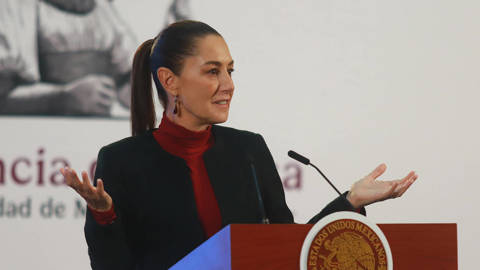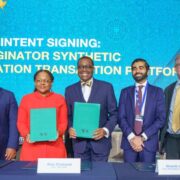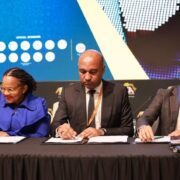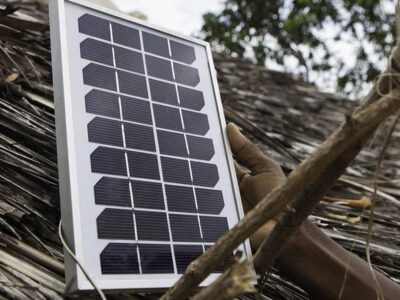
For too long, African countries have been sidelined from the digital revolution due to limited technical capacity and inadequate infrastructure. Artificial intelligence promises to bridge the digital divide, but realizing its potential requires international support and significant investment in critical infrastructure.
LOMÉ – As the world enters an era shaped by artificial intelligence, low- and middle-income countries (LMICs) are expected to capture just 10% of the economic growth generated by AI technologies. But by forming strategic partnerships and making large-scale infrastructure investments, LMICs can harness these technologies to foster inclusive, sustainable development.
- How Trump’s Return Could Benefit Mexico
 Eyepix Group/Getty Images
Eyepix Group/Getty Images
Free to read
- The Eight Headwinds Threatening Global Growth in 2025
 Wong Yu Liang/Getty Images
Wong Yu Liang/Getty Images - Why Bidenomics Did Not Deliver at the Polls
 Spencer Platt/Getty Images
Spencer Platt/Getty Images
Subscriber Favorite
Rapidly evolving AI systems have immense potential to revolutionize public-service delivery and alleviate poverty, unlocking economic opportunities for developing economies like Togo. But fully realizing the promise of these new tools requires adequate infrastructure, such as a reliable electricity supply and broadband connectivity. Without these foundations, the world’s most advanced technologies will remain out of reach for communities that could benefit from them the most.
On November 13-15, Togo’s Ministry of Digital Economy and Transformation organized an international AI conference in Lomé, bringing together government officials, researchers, civil-society leaders, international experts, and students to discuss the potential of emerging technologies to improve public services in the developing world.
Togo is a prime example. During the COVID-19 pandemic, we launched Novissi, one of the world’s first fully digital cash-transfer programs. Initially designed to support low-income urban residents, Novissi rapidly expanded to cover rural areas in Togo’s 200 poorest cantons, enabling more than 920,000 informal-sector workers – roughly 25% of the country’s adult population – to enroll.
By combining machine learning with mobile-phone metadata, satellite imagery, and phone surveys, the Novissi program ultimately identified and supported more than 150,000 households, demonstrating how data-driven approaches can help governments deliver essential services quickly and equitably.
And this is just the beginning. In recent years, we have leveraged data science and digital technologies to improve our emergency response capabilities and make government services more efficient, cost-effective, and responsive to citizens’ needs.
HOLIDAY SALE: PS for less than $0.7 per week 
HOLIDAY SALE: PS for less than $0.7 per week
At a time when democracy is under threat, there is an urgent need for incisive, informed analysis of the issues and questions driving the news – just what PS has always provided. Subscribe now and save $50 on a new subscription.
Subscribe Now
Consider the agriculture sector, which employs two-thirds of Togo’s population and accounts for 40% of its GDP. Using satellite imagery and machine-learning tools like Mosaiks, Togolese policymakers can forecast crop yields, anticipate poor harvests, and craft targeted agricultural policies. But the real strength of these technologies is their versatility: a single investment enables policymakers to make evidence-based decisions on a wide range of issues, from electrification to deforestation.
By bolstering local ownership, African governments can drive inclusive growth. In Togo, we are working to build a sustainable ecosystem of local expertise through initiatives like the newly launched Togo Data Lab, a collaboration between the Ministry of Digital Economy and Transformation and the Center for Effective Global Action at the University of California, Berkeley. The project joins other prominent African institutions working to position Africa at the forefront of digital development, such as the African Institute for Mathematical Sciences and the Global Partnership for Sustainable Development Data.
In Togo, the Lab will assist the Togolese government in building sustainable data-science capabilities, thereby enabling us to use AI tools like large language models (LLMs) to accelerate progress toward the United Nations Sustainable Development Goals. Togolese data scientists trained at the Lab will then collaborate with international experts, thereby ensuring that solutions are driven by local talent.
In its first year, the Togo Data Lab will focus on agriculture, training staff to use Mosaiks to measure crop yields more precisely. But we have much higher ambitions. We see the Lab as a scalable platform capable of addressing major challenges in health, education, and climate policy. We imagine a health-care system transformed by data science, with AI tools improving disease surveillance and enabling policymakers to predict outbreaks of preventable illnesses, and classrooms where LLM-assisted tutors handle administrative tasks, freeing teachers to do what they do best: teaching and connecting with students.
We have made remarkable progress, but there is much more to be done. For too long, African countries have been sidelined from the digital revolution due to limited technical capacity and inadequate infrastructure. That must change, and now is the time to change it.
I urge the international community to join this vital effort. By engaging the private sector and making targeted investments, Africa could become a leader in the global digital economy, not just a participant.
Investing in local capacity not only empowers policymakers in developing countries like Togo to make smarter, data-driven decisions. It also lays the groundwork for a vast global network of problem solvers, ready to harness cutting-edge technologies to tackle the world’s biggest challenges.











Comments